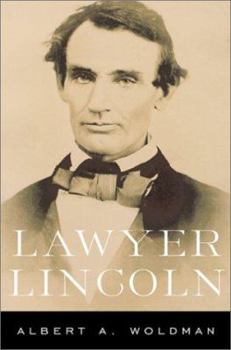Lawyer Lincoln
Select Format
Select Condition 
Book Overview
This classic biography rescues Abe Lincoln, a shrewd practitioner of frontier jurisprudence, from schoolbook myths of Honest Abe. Anecdotal and penetrating, it portrays Lincoln the trial lawyer, the brief lawyer, the appellate lawyer, the railroad and big business lawyer, and for a time the judge. It follows him, too, into his Civil War presidency to attest to status as one of the world's truly great legal minds.
Format:Paperback
Language:English
ISBN:0786709391
ISBN13:9780786709397
Release Date:November 2001
Publisher:Carroll & Graf Publishers
Length:358 Pages
Weight:1.00 lbs.
Dimensions:0.9" x 5.5" x 8.4"
Customer Reviews
3 ratings
Lincoln Was The Prime Example of Good Lawyering.
Published by Thriftbooks.com User , 19 years ago
Abraham Lincoln was a self-taught lawyer. He did "read" and learn the trade from another and did very well for that time. Now, there is someone calling himself a Lincoln lawyer, which fooled me big time, as I expected it to be about one A. Lincoln. The new one is about an unscrupulous, on the down side of life lawyer who has to do his business out of his car. I remember when Debbie Reynolds said that she had to live out of hers out there in L.A. It shows what an unethical person does in the gutter as opposed to the very ethical A. Lincoln of the 1850s. He was known as honest Abe. You can't say the same for the lawyers represented in the new Lincoln book. I have worked for lawyers, and had a couple as personal friends, and I have some knowledge of how that part of the law works. To tear one down for no good reason, is to be on a par with such a seedy, lowdown attorney-at-law who is so low he can't afford a respectable office from which to do legitimate business. Of course, Mickey and his father who gained the gangster's gun as a reward for getting a guilty person off, are not respectable. He was told not to ever let an innocent person go to prison, but that is exactly what he did and it is time to face the music of his own un-doing. Only lowlifes would go to someone who does his business out of a car. It amazes me that even a character in a novel such as this could belong to the Legal Profession.
Lincoln, First-Rate Lawyer
Published by Thriftbooks.com User , 20 years ago
Woldman, Albert A., Lawyer Lincoln. 1936. New York: Carroll & Graf, 2001. Lincoln's career as a lawyer was a strange mixture. For 23 years he handled cases both large and small, for fees ranging from nothing to $5,000. The author takes inconsistent positions, now claiming that Lincoln had no use for law books and that he practiced at a place and time when precedents were few, and gave little preparation to his cases. But then he complete reverses himself and says that Lincoln studied precedents closely, that he argued 178 cases before the Illinois Supreme Court, ranging from a $3 hog case to one involving a third of a million dollars in taxes, and that his cases included conditional sales, fraudulent conveyance, surety, conflicting liens, false imprisonment, jurisdiction, equity of redemption, set-offs, seduction, wagering, slander, recording, land improvement, licenses, trusts, slavery, patent, mandamus, usury, ejectment, out-of-state depositions, trespass on the case, foreclosure, rescission, assumpsit, writ practice, liquor licenses, reapportionment, admiralty, land accretion, minor's contracts, homicide, and important railroad cases involving eminent domain issues, as well as cases involving constitutional questions such as interstate commerce. In addition to railroad corporations, Lincoln represented municipalities, banks, gas companies, insurance companies and large manufacturing and commercial concerns. He litigated stockholders rights and corporate charter provisions. He never refused to represent "soulless corporations" and often tried merely to hold down the amount of damages, as any defense lawyer would. Naturally, he could not do this complex work operating solely by the seat of his pants. Obviously, the man was unique for his day and definitely was not a hayseed lawyer, though he gave the appearance of one by wearing trousers that ended two inches above his shoes. Contrary to what the author tells us, quoting Lincoln's long-term partner, William Herndon, (p. 242) that "Practically he knew nothing about the rules of evidence, of pleading, or practice, as laid down in the textbooks, and seemed to care nothing about them," Lincoln knew his pleas in abatement and in bar, his demurrers, claims of laches, joinder issues, and his appellate bond rules. The parts I like best about him are the events that I can relate to myself: his standing in the Bar for integrity and honesty, the fact that he related to jurors on a personal basis and was unassuming, his refusal to befog, and that he never stood on technicalities but was concise and kept the case simple and direct. There is a "Vic and Sade" quality to Lincoln's downstate Illinois experience (one of his associates was named U. L. Loop), which took me right back to early childhood and my radio days. I learned that Lincoln opposed the Mexican War as preemptive, unconstitutional, and a sneaky way for slavery to be extended west of the Mississippi. I felt his agony at seeing a losing case sl
A good account of the 23 years of the lawyer years
Published by Thriftbooks.com User , 25 years ago
This book shows how the practice of law on the Illinois frontier shaped Lincoln into the leader he became during his presidency.






